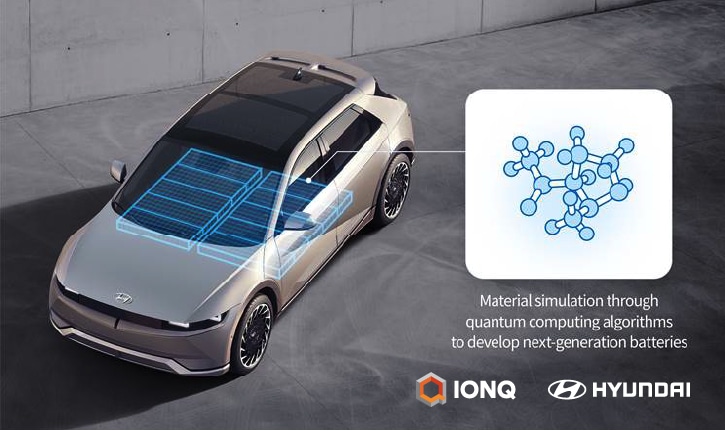Partnership will create largest battery chemistry model yet to be run on a quantum computer, simulating structure and energy of lithium oxide
COLLEGE PARK, Md. & SEOUL, South Korea – IonQ (NYSE: IONQ), a leader in trapped-ion quantum computing, and Hyundai Motor Company today announced a partnership to develop new variational quantum eigensolver (VQE) algorithms to study lithium compounds and their chemical reactions involved in battery chemistry.
Quantum-powered chemistry simulation is expected to significantly enhance the quality of next-generation lithium batteries by making improvements to the devices’ charge and discharge cycles, as well as their durability, capacity and safety.
The partnership pairs IonQ’s expertise in quantum computing and Hyundai’s expertise in lithium batteries. Together, the teams are creating the most advanced battery chemistry model yet developed on quantum computers, measured by the number of qubits and quantum gates.
IonQ and Hyundai are laying the foundation to create better quality batteries by more precisely simulating and controlling their chemical reactions. This research has the potential to lead to new types of source material that save time, cost and effort in the years to come — a critical advancement as batteries are typically the most expensive component of an electric vehicle (EV).
“This creative collaboration with IonQ is expected to provide innovation in the development of basic materials in virtual space for various parts of the future mobility,” said TaeWon Lim, Executive Vice President and Head of Materials Research & Engineering Center at Hyundai Motor Group. “We’re excited to step into the upcoming quantum era and take advantage of the opportunities that await with more effective battery power.”
Today’s collaboration is a crucial component of Hyundai’s Strategy 2025 goals, which include the sale of 560,000 EVs per year and the introduction of more than 12 battery electric vehicle (BEV) models to consumers. Moreover, the partnership is also an important milestone for combating the threat of climate change as EVs play a critical role in meeting global sustainability targets.
“We at IonQ believe in our mission to solve the world’s most complex problems through the ongoing development of our quantum computers, and we see global climate change as one such problem that we can help to tackle with quantum chemistry solutions,” said Peter Chapman, President and CEO of IonQ. “Battery efficiency is one of the most promising emerging areas where quantum computing can make a difference. We are thrilled to be working with Hyundai Motor Company on this project to make EVs a primary mode of transportation across the globe.”
This partnership is the latest in IonQ’s continued efforts in the field of quantum chemistry. Previously, IonQ’s computers were used to demonstrate an end-to-end pipeline for simulating large molecules, such as those present in fertilizer creation. IonQ’s quantum computers have also been used to simulate water molecules, one of the first demonstrations of the potential for quantum computing to tackle quantum chemistry applications.


